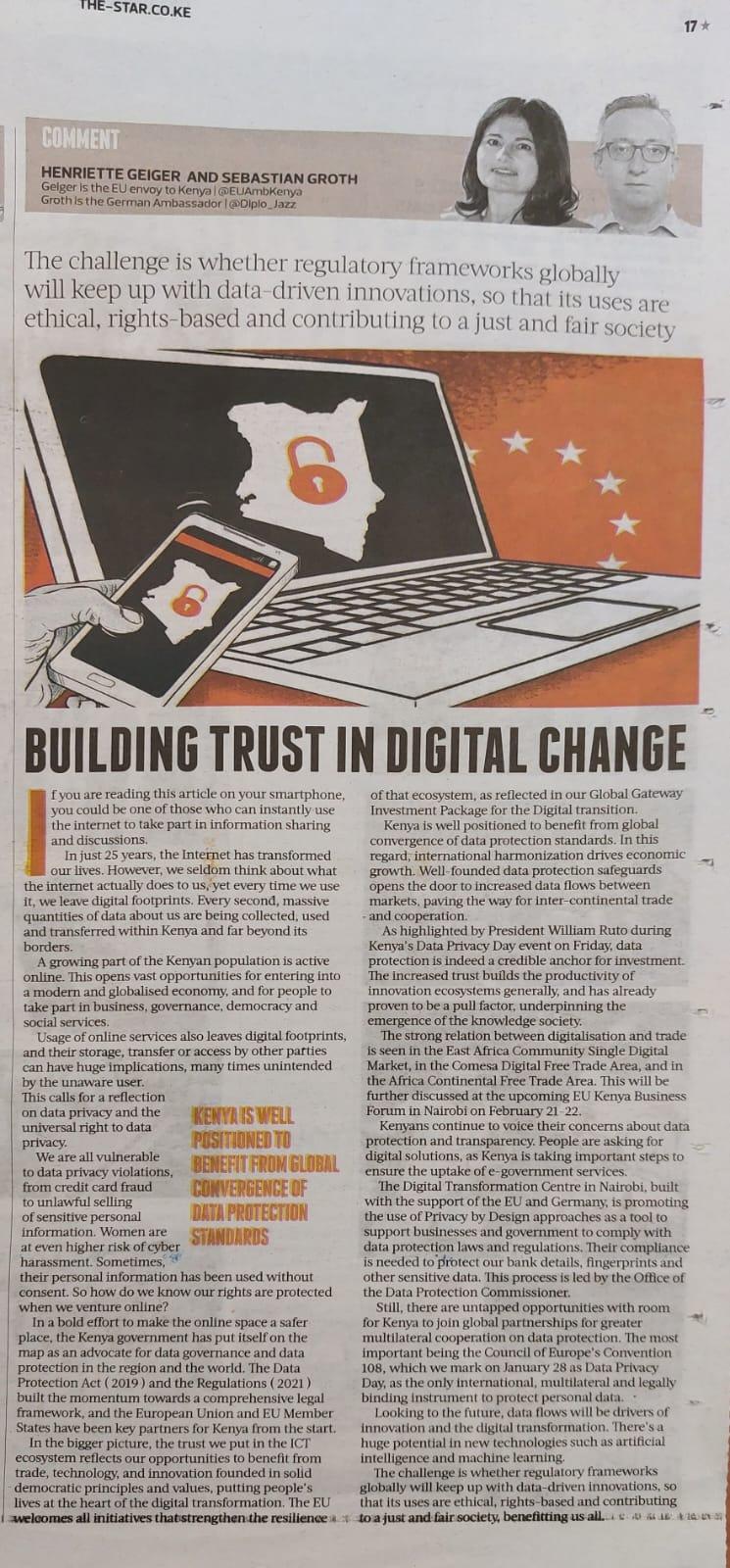GEIGER & GROTH: Building trust in Kenya’s digital transformation

In just 25 years, the Internet has transformed our lives. However, we seldom think about what the internet actually does to us, yet every time we use it, we leave digital footprints. Every second, massive quantities of data about us are being collected, used and transferred within Kenya and far beyond its borders.
A growing part of the Kenyan population is active online. This opens vast opportunities for entering into a modern and globalised economy, and for people to take part in business, governance, democracy and social services. Usage of online services also leaves digital footprints, and their storage, transfer or access by other parties can have huge implications, many times unintended by the unaware user. This calls for a reflection on data privacy and the universal right to data privacy.
We are all vulnerable to data privacy violations, from credit card fraud to unlawful selling of sensitive personal information. Women are at even higher risk of cyber harassment. Sometimes, their personal information has been used without consent. So how do we know our rights are protected when we venture online?
In a bold effort to make the online space a safer place, the Kenya government has put itself on the map as an advocate for data governance and data protection in the region and the world. The Data Protection Act (2019) and the Regulations (2021) built the momentum towards a comprehensive legal framework, and the European Union and EU Member States have been key partners for Kenya from the start. In the bigger picture, the trust we put in the ICT ecosystem reflects our opportunities to benefit from trade, technology, and innovation founded in solid democratic principles and values, putting people’s lives at the heart of the digital transformation. The EU welcomes all initiatives that strengthen the resilience of that ecosystem, as reflected in our Global Gateway Investment Package for the Digital transition.
Kenya is well positioned to benefit from global convergence of data protection standards. In this regard, international harmonization drives economic growth. Well-founded data protection safeguards opens the door to increased data flows between markets, paving the way for inter-continental trade and cooperation. As highlighted by President William Ruto during Kenya’s Data Privacy Day event on Friday, data protection is indeed a credible anchor for investment. The increased trust builds the productivity of innovation ecosystems generally, and has already proven to be a pull factor, underpinning the emergence of the knowledge society. The strong relation between digitalisation and trade is seen in the East African Community Single Digital Market, in the COMESA Digital Free Trade Area, and in the Africa Continental Free Trade Area. This will be further discussed at the upcoming EU Kenya Business Forum in Nairobi on February 21-22.
Kenyans continue to voice their concerns about data protection and transparency. People are asking for digital solutions, as Kenya is taking important steps to ensure the uptake of e-government services. The Digital Transformation Centre in Nairobi, built with the support of the EU and Germany, is promoting the use of Privacy by Design approaches as a tool to support businesses and government to comply with data protection laws and regulations. Their compliance is needed to protect our bank details, fingerprints and other sensitive data. This process is led by the Office of the Data Protection Commissioner.
Still, there are untapped opportunities with room for Kenya to join global partnerships for greater multilateral cooperation on data protection. The most important being the Council of Europe’s Convention 108, which we mark on January 28 as Data Privacy Day, as the only international, multilateral and legally binding instrument to protect personal data.
Looking to the future, data flows will be drivers of innovation and the digital transformation. There’s a huge potential in new technologies such as artificial intelligence and machine learning. The challenge is whether regulatory frameworks globally will keep up with data-driven innovations, so that its uses are ethical, rights-based and contributing to a just and fair society, benefitting us all.
